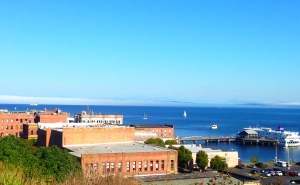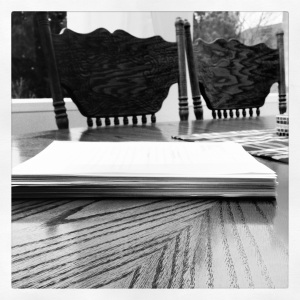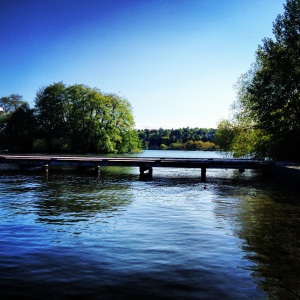I walk down the hill to the town plaza, thinking the Thursday evening concert on the dock will be the ideal coda to yet another blissful summer day. Yesterday’s breathless 84°—the warmest day of the year—segued into today’s carefree, breezy 76°.
The Plaza is empty. I check my watch. The concert should be well underway. Then it hits me. It’s mid-September. September. Public school has been in session for several days, the detritus of the Wooden Boat Festival had been hosed away on Monday. Summer—regardless of the sun’s tango with the magnetic Poles—is officially over. There hasn’t been a concert on the dock for two weeks.
I wander through the marina, coming to rest against the warm bronze flanks of a sea otter. The final busloads of tourists amble down the ochre blocks of our Victorian seaport to the terminus of the piers; the hard consonants of places where dark bread and sausage are eaten at breakfast mingle with rounded drawls dripping with humidity and tangled in mangroves. I join them in gazing into the bays and the vistas beyond.
To the east, the Cascades etch jagged lines into a cerulean horizon, bookended by Mount Baker to the north, Mount Rainier to the south. To the west, the Olympics are confections of cobalt, softly rounded in the late afternoon light and stripped of snow.
Wrapping the peninsula like a velvet ribbon is a bank of fog that stretches from the Salish Sea through Admiralty Bay to the Port Townsend Bay, where it curls around Marrowstone Island. Fog horns blow—a winter sound incongruous with the sparkling diamonds of sun bouncing off waves and a sky radiating heat like warm denim. The Coupeville ferry emerges from the white ridge, blaring a warning siren as sailboats and cargo ships slip past and into the cottony nothingness. I imagine this fog cutting us off from the world, marooning us in Summerland forever.
What has happened to me? My autumn anticipation—visions of soup and flannel, leaves and wood smoke, pencil shavings and pumpkin—used to begin its eager percolation in early August. Even in Seattle—where I learned to love summer after years spent in searing central Washington and the sticky Midwest—I’d had enough by Labor Day. The city grows dull with dust, its gardens and trees limp, its citizens twitchy with Vitamin D; it just feels wrong in that place of espresso and indie bookstores to go so long without the soporific cleanse of cascading rain.
But here. I am not ready. I haven’t worn long pants in months and my legs are tan for the first time since 1988. My arms are a frenzy of freckles, my hair lightened to a coppery gold. More than the physical changes, something has clicked inside. I crave sunlight and heat for the first time in my life (right, so heat is relative. Stop at 75°, please—anything more is just showing off). It's emotional, this connection to the blue and the gold of summer. I tremble as I let go of the stillness of warm forests, to the coming and going of strangers along shaded sidewalks, to the weekly beer dates in the beachfront courtyard of our favorite pub—where pet goats and games of pétanque are minor distractions to the lazy drift of beautiful vessels just beyond.
It's often foggy here on summer mornings, typical for a maritime climate. This is good for writing productivity. But by late morning I can no longer type away in the sunroom. The rays eat away at the fog, blue overtakes white, the computer screen fades in the outrageous bright, and I become drowsy with the heat. I slather on the sunscreen and cart the laptop to the waterfront, to write to the sound of shrieking gulls and the slap of waves. I could do this every day, 365. I fear I have lost have my Northwest duck feathers that hardly notice a rain shower.
It's coming. Today and tomorrow a cheerful sun beams from the weather app on my iPhone. By Wednesday it's yanked away, replaced with a faucet drip of rain or a smudge of overcast. Yes, we will have Indian summer—late September through mid-October will bring those glorious sunrises, goldenrod days, and crisp nights. But it's coming, that endless mutation of gray, green, and brown. The steady tick of rain dripping from evergreen boughs and rhododendron leaves. Days when the high temperature is the same as the low.
I console myself with the knowledge that I now live in a place described as having a Mediterranean climate, with half the rainfall of Seattle. But in the absence of olive trees and cicadas, Roman ruins, and terraced vineyards, I'm not fooled. I will mourn the brown lines of my sandal tan as it fades from the tops of my feet, the shriveling of blackberries I grab by the handful as I bike along the Larry Scott trail. I will mourn my shadow when it no longer falls onto the sand before me. I'm with Henry James on this one.
“Summer afternoon—summer afternoon; to me those have always been the two most beautiful words in the English language.” ― Henry James
“Summer, after all, is a time when wonderful things can happen to quiet people. for those few months, you’re not required to be who everyone thinks you are, and that cut-grass smell in the air and the chance to dive into the deep end of a pool give you a courage you don’t have the rest of the year. you can be grateful and easy, with no eyes on you, and no past. summer just opens the door and lets you out.” ― Deb Caletti, Honey, Baby, Sweetheart
**A version of this post first appeared in this blog on September 14, 2013. A day exactly like today.





